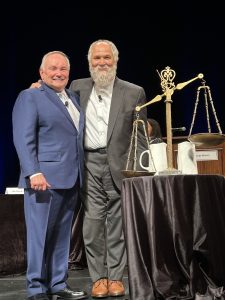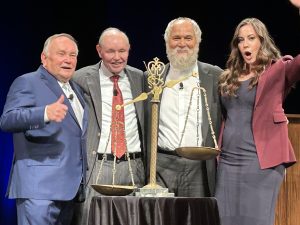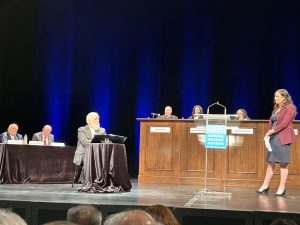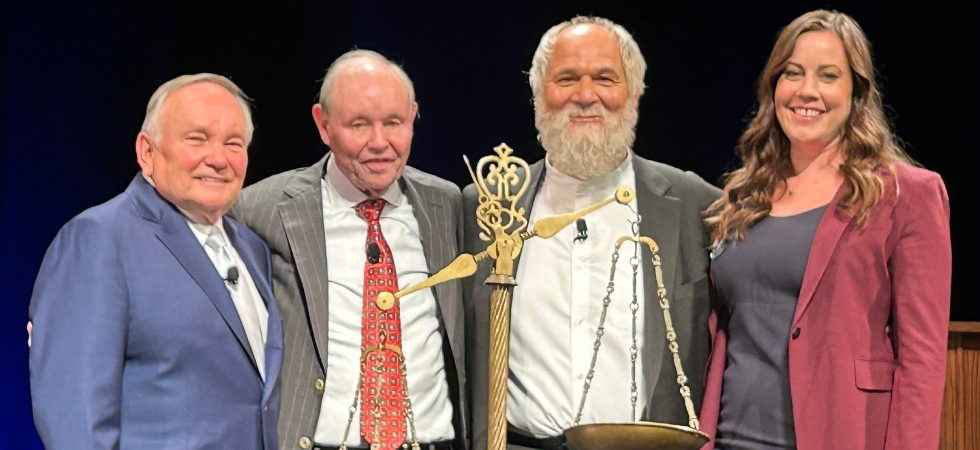Socrates was found not guilty in a mock trial conducted Monday, May 22, 2023, with Robert A. Clifford, founder and senior partner at Clifford Law Offices, Sarah F. King, partner at the firm, and Dan Webb, Co-Executive Chairman of Winston & Strawn, defending him before hundreds of jurors.
In a three-hour event sponsored by the National Hellenic Museum, Socrates was “re-tried” on charges of breaking Athenian laws 2,500 years ago when he was found guilty and put to death at the age of 70 in Ancient Greece.
Clifford and Webb defended Socrates 10 years ago on charges of corrupting young people with his ideas and disrespecting the Greek gods and lost, although Socrates’ life was spared then. In the real trial in 399 B.C., Socrates was put to death by hemlock. This year’s outcome was much different with King examining Socrates on the witness stand and two groups of jurors finding him innocent of the charges.
In a convincing closing argument, Clifford, who told the group he grew up on “the south side of Athens,” said, “[Socrates] did not disrespect the gods. He engaged in a purposeful examination of his own life and he encouraged his allies and the young men that were around him to do the same. There is not a single shred of evidence to support impiety or that he attempted to introduce different gods. There is not a single shred of evidence that he corrupted the youth by telling them at some points you need to question democracy, and he inspired the youth through self-examination…We all grow as a society by engaging in discourse with our friends… He said we should all strive to be good. We should all strive to do good deeds and that’s what he preached to those young men. He told you we should all perform acts of charity; we should all engage in good acts. And he told you that it was his duty as a philosopher to seek truth and to question everything. And for that, he should be put to death?”

Robert A. Clifford with actor and Second City alumnus John Kapelos who portrayed Socrates.
As in ancient Greece, the Chicago audience of 500 became the jurors who decided Socrates’ fate by placing a white chip in a bag for innocence and a blue chip for guilt. They were collected at the end of the trial and then placed on the scales of justice where the decision was overwhelmingly not guilty. The defense team immediately hugged each other in success because it meant Socrates was free to go and continue to speak publicly about the fragilities of democracy.
A 13-member “celebrity” jury on stage also found him not guilty 10-3. The four judges who heard the case from benches across Chicago found him guilty, with U.S. Federal District Court Judge Jorge Alonso of the Northern District of Illinois finding Socrates not guilty on the second charge of corrupting Athens’ youth. He found him guilty on the first charge of impiety or disrespecting the gods, as did the other judges: Illinois Supreme Court Joy Cunningham, and Cook County Circuit Court Judges Anthony C. Kyriakopoulos and Anna H. Demacopoulos. Judge Charles P. Korcoras of the U.S. District Court of the Northern District of Illinois delivered an opening greeting for the crowd explaining the importance of the lessons still to be learned from ancient Greece including the foundation of democracy and trial by jury.

Robert A. Clifford, Dan Webb, Socrates, portrayed by actor Second City alumnus John Kapelos, and Sarah F. King celebrate the trial outcome in their favor.
Webb argued in his opening statement that Socrates, in fact, was a war hero and even became a general in ancient Greece fighting in three battles to defend democracy. “Socrates is not accused of tyranny whatsoever, and yet think about it for a moment. Is everyone who taught someone in school and later if some of those students do bad acts that the teachers are responsible, are the persons responsible for those bad acts, because that’s what they are saying about Socrates.” He went on to say that Socrates believes that the gods are not vindictive, but instead are benevolent and he respects them, and the philosopher asked others to question the true nature of the gods, which relies on the freedom of speech.
Patrick Collins partner at King & Spalding, prosecuted the People’s case along with Tinos Diamantatos of Morgan Lewis & Bockius LLP, and Julie Porter of Salvatore Prescott Porter & Porter PLLC. Actor and Second City alumnus John Kapelos (The Shape of Water, The Breakfast Club, Forever Knight) portrayed Socrates.
Featured jurors at the trial included: Hon. Louis G. Apostol, Public Administrator of Cook County; Monica Eng, Reporter at Axios Chicago; Toby Eveland, Managing Partner at Saul Ewing; Andrea Hanis, Editor of Chicago Daily Law Bulletin; John Howell, Host at 890 WLS AM; Tony Karman, President and Director of EXPO CHICAGO; Eleni Katsoulis, Senior Counsel of Northwestern Memorial Healthcare and President of the Hellenic Bar Association; Young Richard Kim, Associate Professor and Head of Classics and Mediterranean Studies at the University of Illinois Chicago; Johnny Mars, DJ at 93 WXRT FM; Dan Mihalopoulos, Investigative Reporter at 91.5 WBEZ FM; Jim Sotos, Managing Partner at Sotos Law Firm; Georgia Tasiopoulou, Consul of Greece in Chicago; and alternate juror George Bellas, Partner at Bellas & Wachowski Attorneys at Law. Andrea Darlas, award-winning TV and radio personality, served as moderator throughout the evening.
The ticketed event was held at the Harris Theatre, 205 E. Randolph, Chicago. It was the eighth trial involving ancient Greece in the past 10 years sponsored by the Museum.
If you would like to speak to one of the attorneys involved about the trial or executives at The Hellenic Museum, please contact Clifford Law Offices Communications Partner Pamela Sakowicz Menaker at 847-721-0909.
Support for The Trial of Socrates was generously provided by lead sponsors The Jaharis Family Foundation, Calamos Investments, and Clifford Law Offices.

Sarah F. King conducts direct examination of Socrates, portrayed by actor Second City alumnus John Kapelos, during the trial.
“Utilizing some of today’s premier legal minds in a contemporary courtroom setting, The Trial of Socrates will continue our exploration of how the ancient Greeks grappled with timeless controversies that continue to shape modern society,” says NHM Trustee Konstantinos Armiros, counsel at Saul Ewing LLP. “This is a rare opportunity for people to see some of the best attorneys in the nation argue a historic case with unscripted, authentic drama and legal acumen.”
“The Trial of Socrates forces us to confront some of the most difficult questions about democracy and liberty, including what limits free societies can put in place to protect themselves while still maintaining their freedom,” says NHM Director of Research and Content Katherine Kelaidis, Ph.D. “There are no easy or obvious answers to these questions, hence why we are still asking them 2500 years after Socrates’ death.”
Socrates’ trial has fascinated and troubled generations who have struggled to comprehend the death of one of history’s greatest philosophers at the hands of a lawful jury. Convicted in Athens in 399 B.C.E. of impiety and corrupting the youth, Socrates’ pursuit of wisdom was seen as a threat to the survival of Athenian democracy. NHM’s The Trial of Socrates invites audiences to consider a new the fragility of democracy, the limits of freedom, and the imperfection of human justice. Guests at the Trial are invited to participate by exploring the arguments of each side and submitting their “guilty” or “not guilty” vote to literally tip the scale and make their verdict heard, in the style of the courts of ancient Athens.
The dynamic NHM Trial Series highlights the enduring relevance and value of Greek thought and history. It has grown both in reputation and following since its inception in 2013. In 2016, NHM’s The Trial of Antigone was broadcast on WTTW TV (PBS Chicago), and in May 2017 it was nominated for a Midwest regional Emmy. Subsequent NHM Trial Series events have also aired on public television and received regional Emmy nominations. Since 2017, the annual event has been qualified by the Illinois Attorney Registration & Disciplinary Commission (IARDC) for continuing legal education (CLE) credit. Attorneys attending the event received continuing legal education credit.
About the National Hellenic Museum
The National Hellenic Museum (NHM) is the premier U.S. museum dedicated to sharing Greek history, art and culture, from ancient times to the present day, including the modern Greek American experience. NHM preserves the Hellenic legacy and makes this rich heritage relevant today through its extensive collection of more than 10,000 physical artifacts, hundreds of oral histories, exhibitions, educational programs, and special events. Originally founded in 1983 and located in Chicago’s historic Greektown neighborhood since 2011, the museum provides lifelong learning for the community and sparks inquiry and discussion about the broader issues in our lives and society. Regular museum hours are Thursday through Sunday from 10 a.m.-4 p.m. For more information, visit nationalhellenicmuseum.org or call 312-655-1234.

